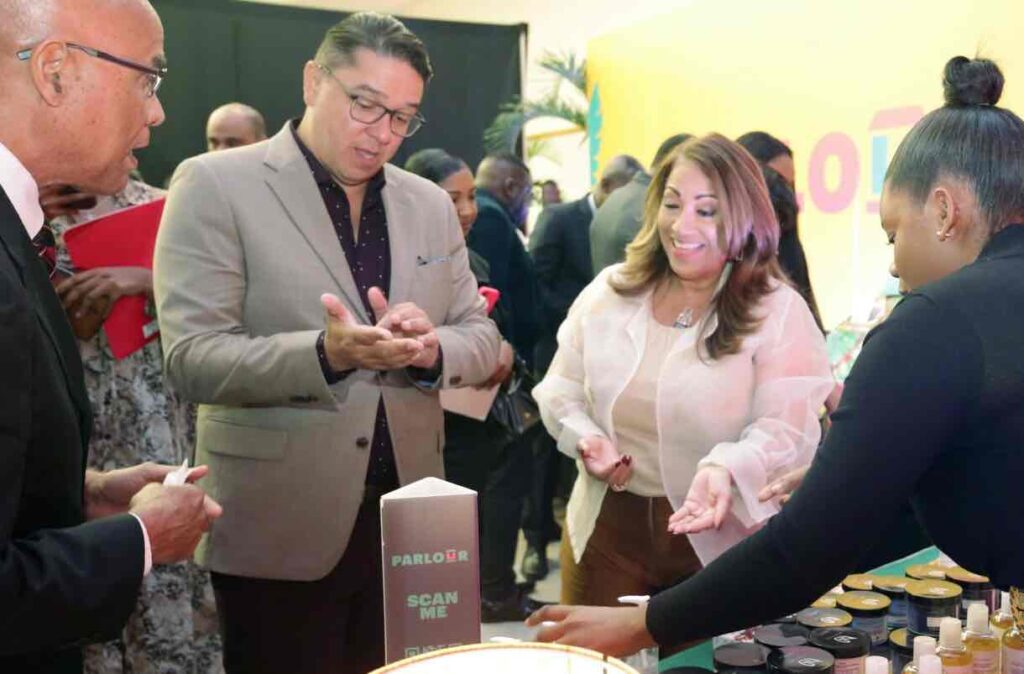
Above: Keino Cox, speaking at the launch of Parlour. Photos courtesy TSTT.
BitDepth 1370 for September 05, 2022
On August 27, TSTT launched its new shopping website, Parlour.
In his speech at the event, Public Utilities Minister Marvin Gonzalez described Parlour as “Destined to fill what some might call a niche, but which I am sure is more of a chasm in the current economic environment.”
Unfortunately, as a market positioning statement, that evaluation is simply wrong.
Parlour is entering a maturing market with at least 30 active players in the private sector offering virtual storefronts for sellers.
If you want to sell physical goods, an online platform isn’t your biggest problem. That will come with setting up payment protocols to get paid from regional and international sources and figuring out how to deliver goods efficiently at a reasonable cost.

In January, Finance Minister Colm Imbert said that the state would become involved in private sector e-commerce with an online marketplace.
TSTT declined to answer questions about links between Parlour and the Minister’s statement.
The company did acknowledge what it described as an “aligned” partnership with the state agency Export Centres Company Limited, which is emphasising ecommerce for small and micro-enterprises in the craft sector.
Despite this down-market push, the most visible products populating Parlour last week were electronic devices from Memory Bank Computers and its subsidiary, iWorld, beauty products and handmade jewellery.
It’s early days yet for the project, but a shopping experience that was meant to emphasise indigenous products might have benefited from front-loading with more exemplary craft and artisan art products to set the tone for the shopping experience.
“Parlour is taking a phased approach to market entry and accessibility,” TSTT explained in response to emailed questions.

“The platform also hosts a few larger sellers from other categories and will continue to onboard strategic partners before embarking on an aggressive scaling programme.”
“In phase 2, Parlour will extend its network outward, first to the wider Caribbean and then, in phase 3, to the world.”
To get a sense of the online market that TSTT is entering, I reached out to Aldwyn Wayne who launched WiShops in May 2021 with a colourful push for a Guiness World Record for website creation and Kadion Preston who opened Caribshopper in February 2020.
According to Wayne, WiShops, active in Jamaica and Trinidad and Tobago, is currently operating with 2,914 paying customers out of 5,800 signups.
The WiShops platform, which customers can use to set up a simple online shop, is free to use, but ecommerce options begin at US$9 per month.
In October, Wayne will launch a new version of WiShops that will expand into Eastern Caribbean countries and Barbados and will be more tightly integrated into WiPay and the ColourBank project, giving customers access to a US dollar card account for their shop.
Between March 2021 and July 2022, WiPay delivered 97,572 transactions with a value of US$7 million in TT and US$20 million overall. WiPay tracks payments internally in USD to manage multiple currency interactions.

“It’s good that someone else has entered the ecommerce market,” said Caribshopper’s Kadion Preston.
Preston explained that CaribShopper’s focus is on getting regional brands into global markets . International brands are not offered on its site.
Caribshopper currently ships to the US and will begin shipping to Canada shortly. The company hopes to begin shipments to Europe in the first quarter of 2023.
The company provides its services to 700 merchants in Jamaica and TT and hosts listings for 50,000 products added since its launch.
Caribshopper accepts products at wholesale prices and applies a markup at point of sale.
Parlour is being asked to run a commercial race in the quicksand of political imperatives.
Paypr, a promising and upcoming mobile e-wallet and payment system was tossed in almost as an aside in the presentation by Keino Cox, Assistant General Manager, Emerging Services and Innovation at TSTT.
That project is, apparently, under review by the Central Bank.
Would Parlour even exist without the ECCL’s mandate to push online marketing?
TSTT said Parlour will be, “The gateway to the Caribbean, the singular, comprehensive online source for most, if not all products of Caribbean origin. Parlour intends to make transacting with and within the Caribbean simpler and more effective.”
These are bold goals for a company that spent years sorting out the billing systems for its core business.
TSTT hopes to, “Move beyond traditional sources of revenue by diversifying its revenue base with new products and services.”
“[TSTT] is strategically focused on creating new sources of revenue. E-commerce is one of those diversification pillars.”
Parlour might be able to do that, but it’s likely to have a hard time achieving a goal of getting 100,000 merchants on its platform while it’s shackled to the task of modernising the ECCL’s 26-year, quixotic effort to improve local craft.


